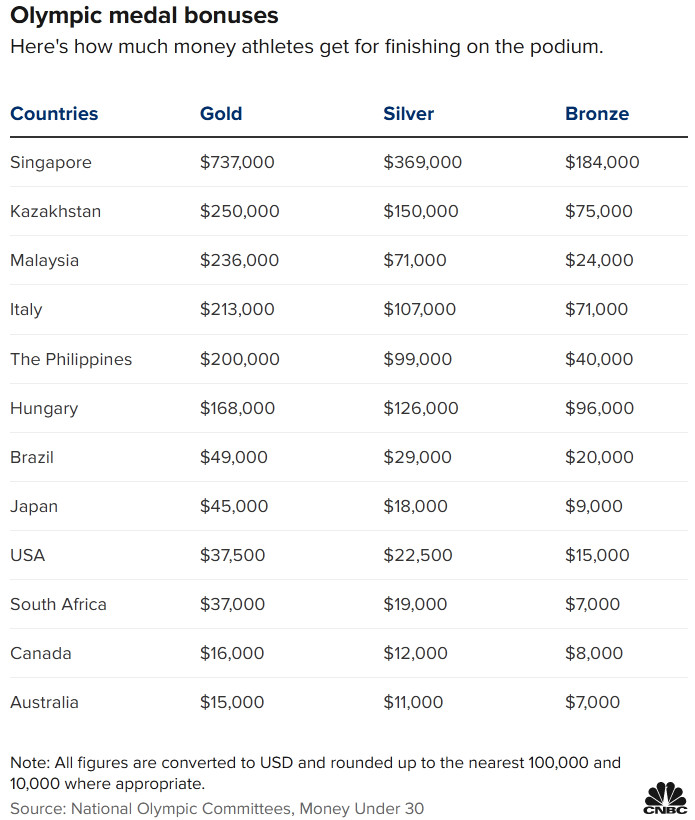
The 2022 Winter Olympics is still ongoing up until February 20 in Beijing, and so far over 200 medals have already been awarded to athletes from all around the world.
It's a super big deal when an athlete manages to finish on the podium. First off, it is all about national pride. For some winners, however, it also means they would be able to take home a handsome cash bonus as well as it would potentially open doors for them to enjoy rare multi-million dollar sponsorship opportunities.
Let's get it straight right away - the International Olympic Committee (IOC) does not actually pay prize money to medalists; in fact, many countries offer cash rewards to their athletes for the amount of medals they win at either the Summer Olympics or Winter Olympics.
CNBC compiled a chart which displayed information from various national Olympic committees, sports associations and personal finance site Money Under 30:

The data showed the US Olympic and Paralympic Committee rewards its athletes the following:
- Gold medal - $37,500
- Silver - $22,500
- Bronze - $15,000
Most of the prize money is not taxable, unless athletes report gross income that exceeds $1 million.
Aside from the monetary reward, American athletes also receive other kinds of support including health insurance, college tuition assistance and access to first-rate medical facilities.
The United States sent over 200 athletes to compete in this year's Winter Olympics in Beijing. So far Team USA has bagged 8 gold medals, 8 silver and 5 bronze.
At the 2021 Summer Olympic Games, American athletes won 39 gold, 41 silver and 33 bronze, scooping up the highest medal tally by any country in Tokyo.
How much do other countries pay for their athlete winners?
There are some countries and territories that give much higher cash incentives to their athletes who finish on the podium. Experts claim that some of it is an attempt to develop national sporting cultures, encouraging both regular and aspiring new athletes to compete and win to bring glory to their own land.
For instance, Singapore generously rewards its gold medalists almost 20 times more than the U.S.
Players who catch their first individual gold medal for the city-state stand to receive 1 million Singapore dollars (US$737,000). The prize money, however, is taxable and the winning recipients are required to return a portion of it to their national sports associations for future training and development.
Kazakhstan rewards their athletes around $250,000 for a gold medal, Italy gives about $213,000, and Philippines around $200,000. Malaysia also pays monthly salaries to its medalists for life: $1,182 for gold, $709 for silver, and $473 USD for bronze.
When javelin thrower Neeraj Chopra from India nabbed the country's very first gold in track-and-field in Tokyo's Summer Olympics last year, many politicians and corporate brands reportedly pledged and awarded millions of rupees as monetary reward for the athlete.
Aside from medal bonuses, winners in these countries are also offered various other compensations. For example, when weightlifter Hidilyn Diaz from the Philippines won the country's first Olympic Gold last year, she was rewarded three house and lots (one was a gift from President Duterte himself), a posh condominium unit, a brand new car and a motorcycle, free lifetime fuel, free meals for life from several restaurants, and free flights for life. These were on top of the initial $200,000 reward for getting the country's first Olympic gold, which brought her total earnings to $970,000! And to think that Diaz was once forced to ask for financial help to support her Olympic campaign.
While the UK does not give medal bonuses, it does allocate £125 million (US$162 million) of government and lottery funds to Olympic and Paralympic Sports annually, some of which goes to yearly athlete stipends. Current funding figures are listed in the UK Sport website. UK Olympic medalists receive a stipend of US$36,000 per year to train and compete.
How hard is it to participate in the Olympics?
To begin with, securing a spot on the Olympics team is not a walk in the park, and athletes usually dedicate most of their time diligently training for the games, thus making it difficult for them to hold onto a full-time employment.
In some types of sports, the equipment, coaching sessions and access to training venues can significantly rack up an athlete's expenses.
While athletes from larger, more competitive countries receive stipends or training allowances from their national sports associations, others need to keep a variety of jobs or even turn to crowdsourcing so that they can finance their Olympic dreams.
Top athletes can also collect prize money by winning national and international tournaments.
Getting sponsored - how hard is it?
Only a select few of top athletes manage to land multi-million dollar endorsements of sponsorship deals, either before competing at the Olympics or right after winning a medal in the Games.
For example, snowboarder Shaun White received his first board sponsorship when he was 7. After he won his first Olympic gold medal in 2006, snowboard-manufacturing company Burton signed him onto a 10-year contract, and Shaun earned around $10 million a year in sponsorships, according to NBCSports.
Last year, American gymnast Simone Biles and swimmer Katie Ledecky received millions in endorsements ahead of the summer games, whereas tennis champ Naomi Osaka reportedly made $55 million from endorsements in one year and she was named the highest-paid female athlete ever, according to reports.
But being able to easily score highly lucrative deals is rare, and hardly the norm.
Most Team USA athletes are actually not represented by sports agents, and some have no endorsements or sponsors at all.
Source: https://www.cnbc.com/2022/02/15/how-much-athletes-at-beijing-olympics-get-for-winning-medals.html

